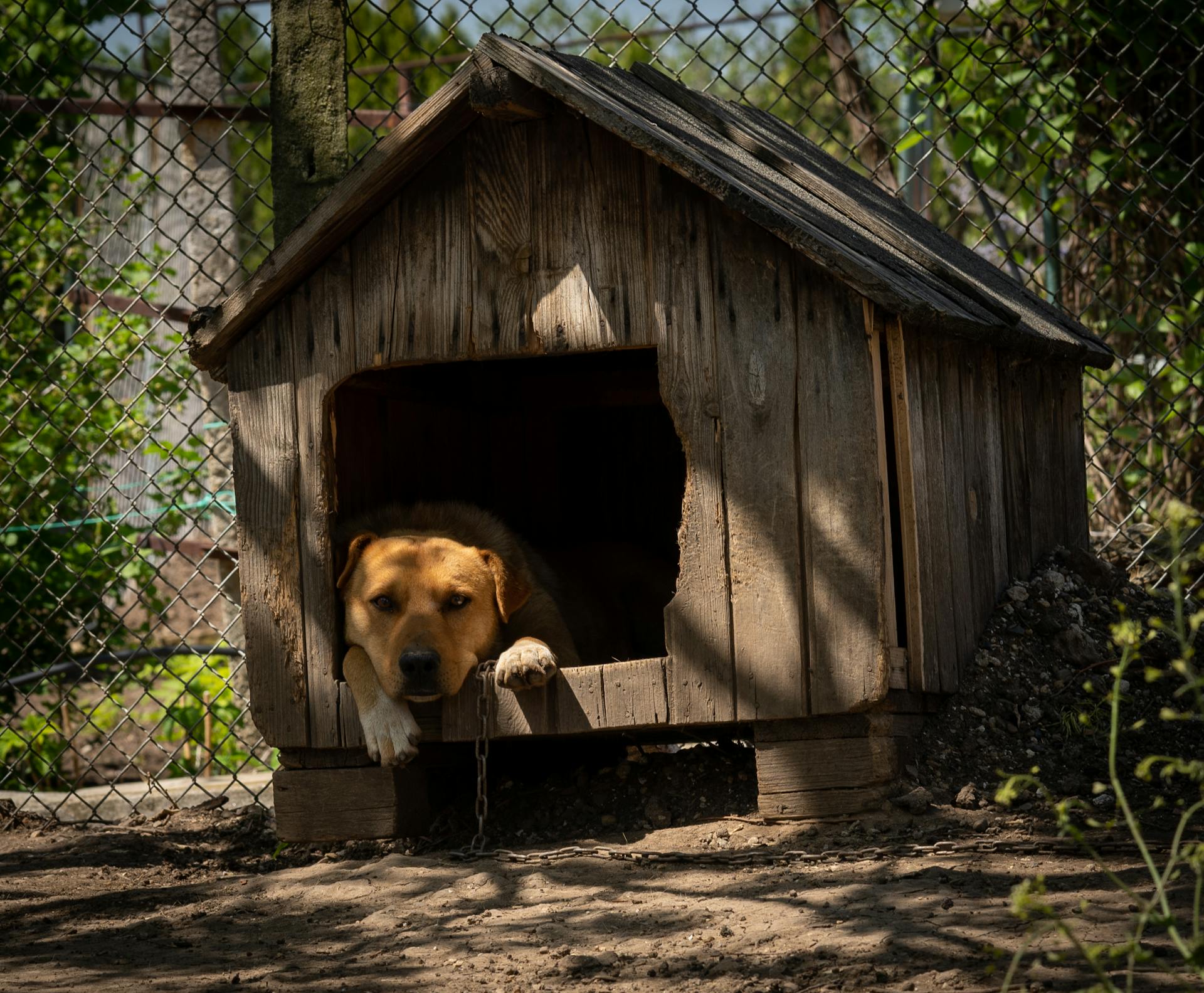
If you are boarding your dog, it is important to make sure they have all of the necessary vaccines. There are several vaccines recommended by most veterinarians to keep your pup safe while they stay at a boarding facility.
At a minimum, your pup should receive vaccinations against rabies, distemper, parvovirus and adenovirus. These help protect against serious illnesses that can be easily spread between animals in communal environments. Depending on where you live and the policies of different facilities, other vaccinations may also be required or suggested for safety reasons. The most common optional vaccines include leptospirosis and bordetella (aka kennel cough).
Before leaving them at a boarding facility make sure that their vaccination history is up-to-date and shared with the staff. Be let them know of any health concerns or conditions so proper care can be provided during their stay! It's also important to remember that not just puppies need vaccines; adult dogs should receive boosters every year or two to stay protected from disease and keep their immunity strong enough to fight off potentially deadly viruses.
Providing adequate protection can guarantee that yours furry friend will have a safe trip - no matter what kind of adventure lies ahead!
Discover more: Is Dog Boarding Safe
What vaccinations do puppies need to be boarded?
If you are planning to board your puppy and have not yet gotten it vaccinated, it is important to get the necessary vaccinations in order to keep your pup safe while they stay away from home. Most boarding facilities require that puppies are up to date on their core and non-core vaccinations.
The core vaccines needed for puppies include: distemper, parvovirus, hepatitis, parainfluenza (all four viruses comprise the DHPP vaccine) and rabies. These vaccines should be administered in a series of at least two shots over a period of weeks starting as early as 8-weeks old depending on the recommendations from your veterinarian. Non-core vaccines include bordetella (kennel cough), leptospirosis and canine influenza; which may need to be administered depending on where you will be boarding your pet. Depending on where you live or travel there may also be additional regional parasites that an additional vaccine would need to be considered such as heartworm preventatives or tick/flea prevention products.
Your veterinarian can help guide you through what vaccinations are best for your puppy dependent upon lifestyle factors such as living in an apartment or visiting dog parks or outdoor recreation areas. The boarding facility should also provide specifics regarding their vaccination requirements before booking a stay so make sure follow protocols set forth by the facility including having proof of current vaccinations prior to check-in so if any questions do arise when dropping off make sure no pet is able connect with other animals without being updated correctly!
For another approach, see: Why Is My Dog so Tired after Boarding?
Which vaccines should pet owners consider for their dog before boarding?
If you’re planning to board your dog, it’s important to make sure they’re up-to-date on their vaccines. Not only will this help guard against potential infection or disease, but many boarding facilities require proof of vaccination. Vaccinations every year are strongly recommended to ensure your pup stays healthy and safe while they’re away from you.
The core vaccinations that every pup should receive before they board include distemper, parvovirus, canine hepatitis and rabies; these are known as core or combination vaccines because all four shots typically come together in one injection. Bordetella is another important vaccine for dogs boarding in facilities with other dogs; this “kennel cough” vaccine protects against certain potentially contagious upper respiratory ailments common among pups boarding together. Your vet may also suggest additional specific vaccines depending on the climate of the region where your pet will be staying as well as any other factors such as duration of stay and contact with wildlife/ rodents.
Keep in mind that not all breeds reactively require the same vaccinations; for instance, if you have a toy breed pup who's under 5lbs there's no requirement for them to receive the leptospirosis vaccine since small dogs aren't prone to contracting it from passing through contaminated water sources like larger breeds may be during outdoor activities at the kennel facility.
Finally there are non-core routine vaccinations available depending on lifestyle of how often your pup boards such as Costridium and Giardia which prevent protozoa diarrhea when exposed to infected environments such a water park/dog parks etc etc/ So discuss any potential risks/issues along with an overall general health overview each yearly appointment with your vet for further professional recommendations about what might be best needed for any trip away from home!
Additional reading: Do Dogs Need Water at Night
What immunizations do dogs need to stay in a kennel or facility?
If you’re a dog owner or pet lover, chances are you’ve heard the phrase “immunizations for dogs.” Dogs need certain immunizations to stay healthy and safe in a kennel or facility. There are many different kinds of vaccinations commonly given to dogs, each designed to protect them against particular diseases.
The core vaccines that all dogs must have to stay in a kennel or other facility include rabies, distemper combined (often referred to as DHLPP), bordetella and canine parvovirus (commonly referred to as “parvo”). All four of these diseases can be fatal if contracted by an unprotected dog. The rabies vaccine is required by law in many places due its danger if passed from animal to human - though fortunately rare.
The type of vaccine your pup will receive will generally depend on the area where it resides and what kind of risk environment it may come into contact with during its time in the facility or kennel. For instance, some facilities may require additional vaccines such as those protecting against leptospirosis or influenza which should be discussed with the veterinarian when considering boarding your pup at any given venue.
Additional inoculations for immunizing dogs vary depending on age and risk factors likely affecting their environment but regular consultation with your vet should help keep track of when shots are due and what kind they might require so that there's no lapse in protection while static at any residential centre – such as a kennel – for any length of time!
Take a look at this: What Vaccines Do Dogs Need for Boarding?
What kinds of diseases do boarding facilities protect against with dog vaccines?
Welcome to today’s blog post! In this post, we will be looking at the various types of diseases that boarding facilities protect against with dog vaccines. Vaccines are vitally important for any pet, and can prevent a large number of diseases in dogs.
One common disease that boarding facilities protect against with dog vaccines is Canine Parvovirus (CPV). CPV causes severe vomiting and diarrhea, often resulting in dehydration and death if left untreated. If a boarding facility vaccinates its guests against CPV, they can help ensure that any canine guests don’t contract this virus while staying there.
Another type of disease that boarding facilities should consider protecting against is Canine Distemper Virus (CDV). This virus affects the respiratory system, nervous system and gastrointestinal tract of dogs, leading to severe illness or even death in some cases. To protect their canine guests from contracting CDV, boarding facilities should make sure all of their guests are up to date on their vaccinations before letting them stay at the facility.
Finally, Rabies is another important vaccine for dogs living in or visiting a boarding facility as this fatal disease can easily be infected by other wildlife or animals brought into the area by visitors or staff members at the facility. Having all canine companions vaccinated before being allowed into the premises help ensure everyone on site stays safe from Rabies infection!
In conclusion, it’s clear that dog vaccines are an important part of keeping our beloved four-legged friends safe while they visit or live at an animal care center such as a boarding facility! By getting up-to-date vaccinations for our pooches against diseases such as Canine Parvovirus (CPV), Canine Distemper Virus (CDV) and Rabies we can reduce the risk posed by these serious illnesses to both our pets and those around them while they stay away from home - protection provided through proper vaccinations is always worth it!
Broaden your view: What Vaccines Do Dogs Need for Grooming?
What are the routine vaccinations that are necessary for boarding a dog?
When you board your furry friend, it's important to remember that their health and safety comes first. Vaccinating your pet before boarding is vital in order to keep them safe and healthy.
There are several core vaccinations that all dogs should have prior to boarding:.
1) Rabies: This vaccination is among the most common and important vaccines for all pets, regardless of whether they're traveling or not. The rabies vaccine helps protect your dog from the fatal virus, by creating antibodies against it. The vaccine must be updated every three years for maximum protection so make sure it's up to date before boarding.
2) Distemper: Distemper is a severe infectious disease caused by a virus which affects all breeds of dogs but can also affect rabbits, raccoons and other wildlife animals which may come in contact with your dog while boarding. In order to protect against this disease, dogs need yearly booster shots of distemper vaccination when they’re at least 6 months old (or immediately if they’re younger than six months).
3)Parvovirus: A highly contagious virus that can lead to anemia, depression, vomiting and fever in puppies as young as six weeks old. While older pets may show no sign of infection but still shed high amounts of the virus through their body fluids - making them highly contagious. Vaccination for parvovirus should be done twice when puppy is three months old then again one year later before being boarded again with pet sitters or kennels who accept only vaccinated cats & dogs..
4) Leptospirosis Vaccine: Leptospirosis is a zoonotic bacterial infection spread by contact with water contaminated by wild animal urine or contact with air droplets containing the bacteria from infected animal sources like rats or skunks – making it very necessary that you have this injection done before potentially exposing your dog upon boarding outside amongst nature away from home surroundings where this bacteria could lurk on damp land undercover just unnoticed! It requires two doses given 3-4 weeks apart as part of an initial series; thereafter annual boosters are recommended depending on lifestyle/potential exposure level
These four routine vaccinations are required for safe & healthy pet boardings so make sure you've consulted with a vet beforehand about what type would be best appropriate for the needs addressed & specific needs pertaining individually within situations such as allergies/Age/Weight etc... ultimately providing pathing pups around those corners! :)
Curious to learn more? Check out: How Often Do Dogs Need Rabies Vaccination
Are there any additional vaccinations that may be required for dogs to be allowed to be boarded?
Taking your pup to the kennel for a vacation while you’re away can be a great solution. But with it come certain vaccinations requirements, including additional boosters that may be needed depending on where you plan to board Fido.
The core vaccinations for dogs recommend by the American Animal Hospital Association are Rabies, Distemper, Parvovirus, and Bordetella (the “kennel cough” vaccine), and Leptospirosis. Depending on the kennel facility, there may also be additional vaccination requirements more specific to their guidelines for boarding pets.
One of these is usually Lyme Disease vaccination due to its increasing prevalence in many areas of the country. Another one is Canine Influenza Vaccination (CIV) which covers both types A and B of influenza virus in dogs; this is especially important if your dog goes around other boards or frequents doggie daycare often since they are constantly exposed to other animals there. Lastly Hepatitis C provides broad protection against both adenovirus type 1 and type 2; although this particular vaccine isn’t necessary everywhere yet it’s becoming more common as legislation changes across states.
So before making any final arrangements at a boarding facility, make sure you know what kind of vaccines they require so that you can provide all necessary documentation when dropping off your pet!
Related reading: Dog Boarding Requirements
Sources
- https://blossomtips.com/rehoming-a-dog-how-to-deal-with-pet-loss/
- https://www.petmd.com/dog/conditions/infectious-parasitic/c_dg_canine_parvovirus_infection
- https://wikitravel.org/en/Bangkok
- https://www.gov.uk/government/publications/animal-activities-licensing-guidance-for-local-authorities/dog-kennel-boarding-licensing-statutory-guidance-for-local-authorities
- https://www.pcgamer.com/microsoft-says-a-sony-deal-with-activision-stops-call-of-duty-coming-to-game-pass/
- https://www.rspca.org.uk/adviceandwelfare/pets/general/holiday/leavingyourpet
- https://www.johnnyjet.com/travel-news-today-everything-you-need-to-know/
- https://www.pets4homes.co.uk/dog-breeds/miniature-dachshund/
- https://www.finder.com.au/dog-vaccinations
- https://www.pets4homes.co.uk/dog-breeds/lakeland-terrier/
- https://wagwalking.com/condition/jaundice
- https://www.enjuris.com/blog/questions/veterinary-negligence-law/
- https://www.flypgs.com/ru/%d0%bf%d0%be%d0%bb%d0%b5%d0%b7%d0%bd%d0%b0%d1%8f-%d0%b8%d0%bd%d1%84%d0%be%d1%80%d0%bc%d0%b0%d1%86%d0%b8%d1%8f/%d0%bf%d0%be%d0%bb%d0%b5%d1%82%d0%bd%d0%b0%d1%8f-%d0%b8%d0%bd%d1%84%d0%be%d1%80%d0%bc%d0%b0%d1%86%d0%b8%d1%8f/%d0%be%d0%b1%d1%89%d0%b8%d0%b5-%d0%bf%d1%80%d0%b0%d0%b2%d0%b8%d0%bb%d0%b0
- https://www.theverge.com/2022/10/19/23411972/microsoft-xbox-mobile-store-games
- https://en.wikipedia.org/wiki/Feline_vaccination
Featured Images: pexels.com


